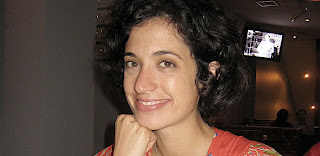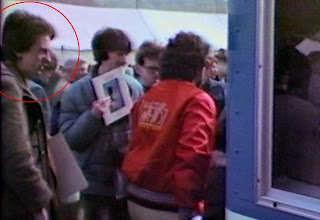“Writing In Treatment” is a bit of a come-on title, it’s as if I’ve found some news for you and will be linking like crazy to insightful interviewers. And it is a little like that.
Here’s the Los Angeles Times reviewing the new second season of In Treatment and saying “the stories are even better than they were last season and that’s saying something”. And The Boston Globe has a good piece about both the original Israeli series and the American adaptation.
But what that Boston Globe piece does that I’m trying to do today and really rather failed to do last time is talk about the writers. Perhaps chiefly because I want to enthuse about them but also because I think there are signs for the future here, both good and bad signs.
Last time I spoke of the writing, I didn’t speak of the writers. I think I was a bit awash with writers at the time: I’d just seen 43 episodes over 14 days, most of which had individual writers but some were team-written, and 42 of them were direct translation/adaptations of the Israeli originals by more writers.
Then there was a showrunner on the US version who wrote the first five episodes to set the style and doubtlessly worked at least in part on all the other episodes. That was Rodrigo Garcia but there was also a showrunner/writer on the Israeli show, Be’Tipul and he created the whole thing: Hagai Levi.
I watched the show for the same reason you watch anything: it sounded good, I thought I’d like it. Then I really, really liked it and it was a can’t-stuff-your-face-fast-enough race to the end of the season.
Now I’m watching it again. But as a writer. And I’m slicing it a different way. Rather than one episode of Laura’s therapy sessions, then Alex’s, then Sophie’s, then Jake and Amy, then Paul’s, rinse, repeat, I’m watching all of Sophie’s. And by focusing on the one, and I’ll admit aided by a handy writer list on the DVD box that I hadn’t noticed before, I’m seeing that Sarah Treem wrote the last eight of the nine Sophie episodes. (Garcia did the first of this one as well.) That link is to her IMDb list, as are most of the links here, but in her case don’t bother: it just lists In Treatment. Instead, try the New York Times which has a review of A Feminine Ending, a stage play of hers. But it also has audio of Treem herself talking about that play. Then The Village Voice talks about how Treem and other new writers made up the whole of the 2007/8 season for the Playwrights Horizons company. That company claims to always champion new writing but for that year, it did nothing else and – this is not directly stated but it’s only barely hidden – it was because its regular writers were rubbish.
That’s a little harsh.
I don’t know much yet about any of the other writers on In Treatment but even if Sarah Treem is the only newcomer, isn’t that marvellous? In Treatment was a fairly chancy commission for HBO and it wasn’t like they dabbled in it. There was apparently a five-part pilot made, which presumably makes up week 1 of the series, but still you can’t imagine ITV1 commissioning 40-odd episodes of anything new. If they ever did, if any major British television company did risk commissioning that many episodes of a non-soap drama, can you imagine them ever trying new writers on it?
Yes.
Life on Mars did. One episode of that was to be written by a new writer to television, I don’t know who, I only know it was a man. Something happened, again I don’t know what, and his script was not used but there was that willingness to take a chance. Similarly, Ashes to Ashes was the first producing job for Beth Willis and look at her now: she’s the new co-exec producer on Doctor Who.
It’s called taking a chance for a reason, though. You chance your arm, you try your hand, you sometimes burn your fingers. If a brand new writer fails to deliver a filmable script of The Bill – um, bad example, sorry. If a brand new writer fails to deliver a filmable episode of Hustle, that’s a gigantic production machine derailed. You’ve got to believe they’ll deliver the goods, they’ve got to be as much of a safe pair of hands as you can manage. I’ve felt precisely this when I’ve commissioned new writers on magazines and I’ve had bad experiences from that. Also some good, actually, and that keeps you doing it, but a lot of bad. And a bad experience for me means having to write an emergency article in a couple of hours, that’s substantially easier than writing an hour’s television over a weekend.
This is the reason we’re all guided to soaps: they can be derailed too but they’re hardy little buggers and they can cope better. And it’s fair enough: if you’ve written 100 episodes of a soap, you’re someone who delivers. When you cannot have a blank screen, that’s a very tempting and very practical thing to look for in a new writer.
I think it’s a calamitous side-effect that soaps have become seen as the only route through and moreover that because such a proportion of new writers and producers come through the soap route that it’s seen as the right way to do drama. People who don’t write soaps are very dismissive of the genre, but fortunately people who do write soaps believe they’re already writing every type of drama so the general wrongness just balances out. Funnily enough, there is huge, rich drama in the gap between: when drama writers try soap and soap writers try drama.
Anyway, In Treatment, just to yank this back to the topic, is not a soap. It’s far more painful than that and if a story is about someone fancying someone, it cuts truer than the soap version would. It’s willing to go down areas that might end the story early. It does end the story early. More than one patient does not last the whole nine weeks of the series. And then it sees what happens next, what’s underlying everything, what’s deeper. Rather like therapy, actually. Apparently the original Israeli series had a therapist advising the writers and he or she did complain a lot: not about inaccuracy but about how the scripts didn’t dig deep enough. So then they did.
There’s a lot of hyperbole about the original show, about how it’s the greatest drama Israeli television has ever produced. It’s certainly the only one I’ve heard of, so maybe that’s true. But there is also the harsh, practical fact that it may well be the cheapest.
It’s certainly, surely, HBO’s cheapest-ever drama. Some sources say each episode took two days to film, others say it was only one. It is only half an hour per episode, but compare that to a ten-day shoot for a typical one-hour US drama and it’s probably cheaper than even reality TV.
I don’t want to see British television drama budgets cut. But they’re being cut. I think it’s a preposterously short-sighted notion: notice how ITV1 is in trouble but ITV3 is doing very well – because it’s showing all the dramas ITV used to make. You can’t repeat Britain’s Got Talent, you can and they do repeat successfully repeat Thunderbirds over and over.
If there’s any good to come from lower budgets, it’s that we may see things like In Treatment. BBC4 is already making cheap dramas that are punching well above their weight: think of the dramatisations of the lives of people like Hughie Green. Trevor Eve received the greatest share of the praise for that, and his performance was superb, he managed to convey not only a tremendous impression of Hughie Green but all the nuances and the strengths of the script. It’s just that it was the writer, Tony Basgallop who put those nuances and those strengths in there.
Fast-cutting scenes, action and stupendous locations cost money: tight, tense, intimate writing, not so much. Unfortunately, the type of writing that keeps you compelled without any eye candy, that involves you in characters without melodrama, that’s cripplingly hard to do. The rewards are richer, for the viewer, but the gamble is higher for the writer. And it’s a harsh and unpalatable fact that being given the chance to write this type of work is not even a remote guarantee that you’re capable of it.
If drama budgets are cut, we’re going to see an awful lot of crap. But we might see things like In Treatment and they might bring us new writers, new voices.
I’m obviously arguing with my writing hat on: I said as much at the top. But I’m a drama nut and as a viewer I just want to be in the story, whatever it is and however much it cost. As a writer, mind, I should tell you I’m available. I’m here through Thursday, two-drink minimum, see your waitress for details.
William


